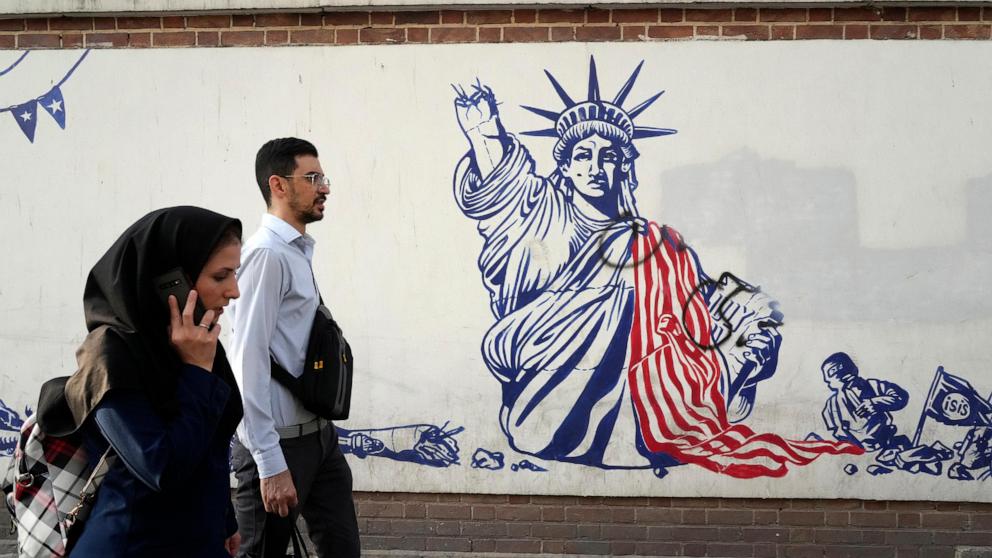DUBAI, United Arab Emirates — As the final televised debate of Iran's presidential election drew to a close, one of the leading candidates to replace the late hardline President Ebrahim Raisi named the man who has perhaps done more than anyone to change the trajectory of Iran's relations with the world in recent years.
Mohammed Bagher Qalibaf, speaker of Iran's parliament and a candidate in Friday's elections, warned that if economic problems were not resolved, the next president “may be forced to either sell Iran to Trump or provoke dangerous tensions in the country.”
President Donald Trump's decision to unilaterally withdraw the United States from the Iran nuclear deal in 2018 reintroduced harsh sanctions and largely excluded Iran from the global economy. This exacerbated the political situation in Iran, which was already beset by economic issues and mass protests over women's rights. A series of attacks on land and sea then escalated, and Iran began enriching uranium to near-weapons-grade levels.
Hamas' attack on Israel on October 7 and Israel's subsequent war against militants in the Gaza Strip added fuel to a fire that threatened to engulf the entire Middle East. Iran has become a direct belligerent in the conflict, supporting an array of militias including Hamas, Lebanon's Hezbollah and Yemen's Houthi rebels, and launching unprecedented direct attacks against Israel during the war.
What happens in both the war and Iran's future may depend directly on the United States, denounced as the “Great Satan” by Ayatollah Khomeini during the 1979 Iranian revolution and still reviled at major events such as speeches this week by 85-year-old Supreme Leader Ayatollah Ali Khamenei.
Despite the fierce criticism, the United States has come up repeatedly in the campaign, with Khamenei warning people this week not to support candidates who “see all roads to progress going through the United States” — an implicit criticism of Massoud Pezeshkian, the only reformer in the race who fully supports returning to the 2015 nuclear deal.
Trump has emerged as a recurring theme among the six presidential candidates, including current Vice President and hard-liner Amir Hossein Kajizadeh Hashemi, who argued that if Trump wins the US presidential election, “we can negotiate with him and impose our demands.”
He disagreed with Shiite cleric Mostafa Pourmohammadi, who warned that Iran should join U.S. talks now before Trump is re-elected, but his campaign also printed posters featuring him side-by-side with Trump and declaring, “I'm the man who can take on Trump!”
Hardline candidate Said Djalili also vowed to fight Trump, accusing his rivals of being “afraid” of him.
Meanwhile, Trump has spoken out about Iran on the campaign trail in recent days. On his podcast “All In,” Trump reiterated that he wanted to make a “fair deal with Iran.” But he also tried to argue that Iran's theocratic government, which has long called for Israel's destruction, should have had some form of diplomatic recognition agreement with Israel, like the United Arab Emirates and Bahrain did during Trump's presidency.
“A kid could have made a deal with them and Biden did nothing,” Trump alleged.
Interestingly, President Joe Biden's name was never mentioned during the Iranian election debates. Before Raisi's death in a helicopter crash in May, the US under Biden had held several rounds of indirect talks with Iranian officials.
While the Biden administration has criticized Iran broadly, particularly following the 2022 death of Mahsa Amini and subsequent protests for women's rights, it has also paved the way for Iran to access some of its frozen assets overseas, including a prisoner exchange deal between the two countries in September, less than a month before the Israeli-Hamas war began.
Then there are Iranian crude sales. Though technically under sanctions, Iran recently reported selling 2.5 million barrels a day, most of which was likely sold to China at a discount. Former Iranian Foreign Minister Mohammad Javad Zarif, who cut the nuclear deal under a relatively moderate President Hassan Rouhani and now supports reformist candidate Pezechkian, has directly attributed these sales to Biden administration policies.
“It's not because of our friends that oil sales have increased, but when Biden came to power, they adopted a policy of loosening sanctions,” Zarif said, a euphemism for hardliners. “Come on Trump, let's see what our friends will do.”
With broader talks with world powers in Vienna to revive the nuclear deal collapsing, Biden may be trying to repeat a strategy he used as vice president under Barack Obama: negotiating quietly and indirectly with Iran toward a deal that could later come to the negotiating table.
But much of the Biden administration's planned U.S. policy for the Middle East has been upended by the Israeli-Hamas war, including a Saudi security agreement that could see Riyadh diplomatically recognize Israel.
Meanwhile, the real uncertainty for Iran is when the US presidential elections will be held on November 5. If Biden is re-elected, he will likely continue the carrot-and-stick approach adopted during his previous terms. If Trump is re-elected, it could herald more talk of the deal, but it also carries risks. In 2020, Trump killed Revolutionary Guard Gen. Qassem Soleimani in a drone strike while claiming he wanted a deal with Iran.
A war between Israel and Lebanon, or even the possibility of the Houthis launching missile attacks on American warships during military operations, could also dramatically upend the outlook for both Tehran and Washington.
But for now, Iran and the United States remain intertwined in a tense relationship, as they have been for decades.
___
Jon Gambrell, Associated Press Gulf and Iran news director, has reported from the Gulf Cooperation Council countries, Iran and around the world since joining the AP in 2006.

